Interaktive Präsentationsfolien auf Slides.com
Halbautomatische Katalogisierung von Artikeln für einen Fachinformationsdienst
Kim, Timotheus Chang Whae
Workshop “Linked Open Citation Database (LOC-DB) Workshop”
Mannheim, 07.11.2017
timotheus.kim@uni-tuebingen.de

Verfahren & Tools
- ImageWare - Metadaten aus Printzeitschriften
- Zotero "Zotkat" - Metadaten aus Online-Zeitschriften
- Zotkat 2.0 - Batch-Import der Metadaten in WinIBW


ImageWare - Print only Zeitschriftenartikel
Template
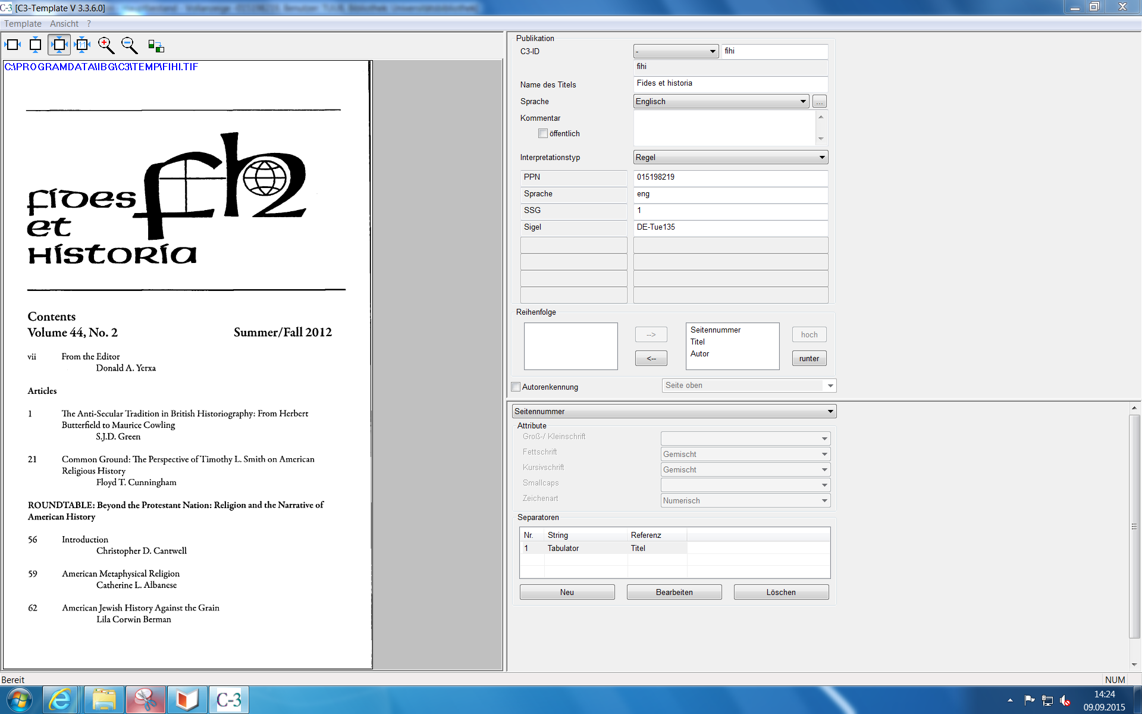
Ablageordner

Manuelle Ergänzung
(Jahr, Heft- und Bandnummer)

Import

Erkennungsprozess

Auslesen von Metadaten
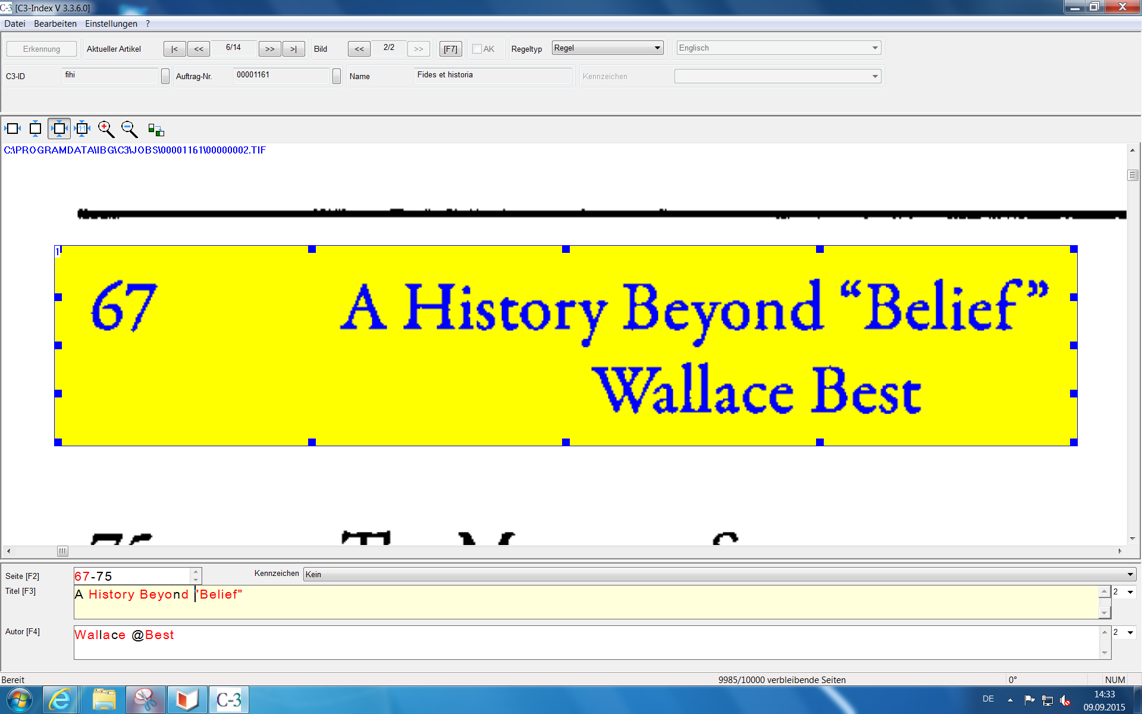
XML-Export
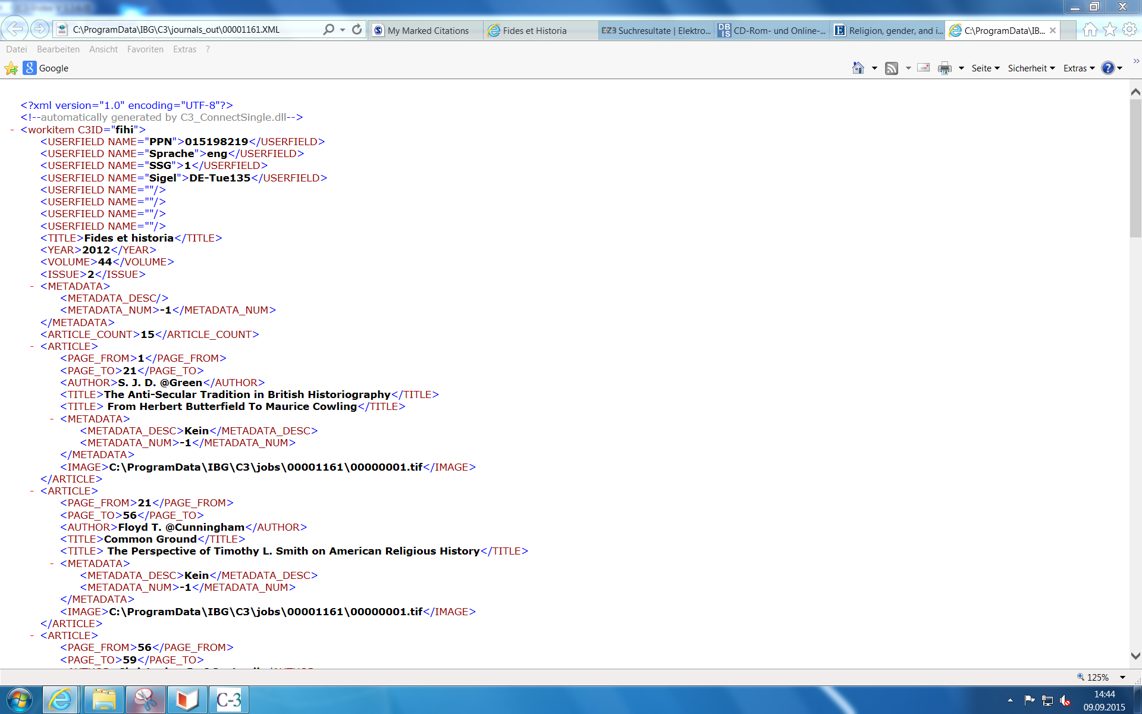
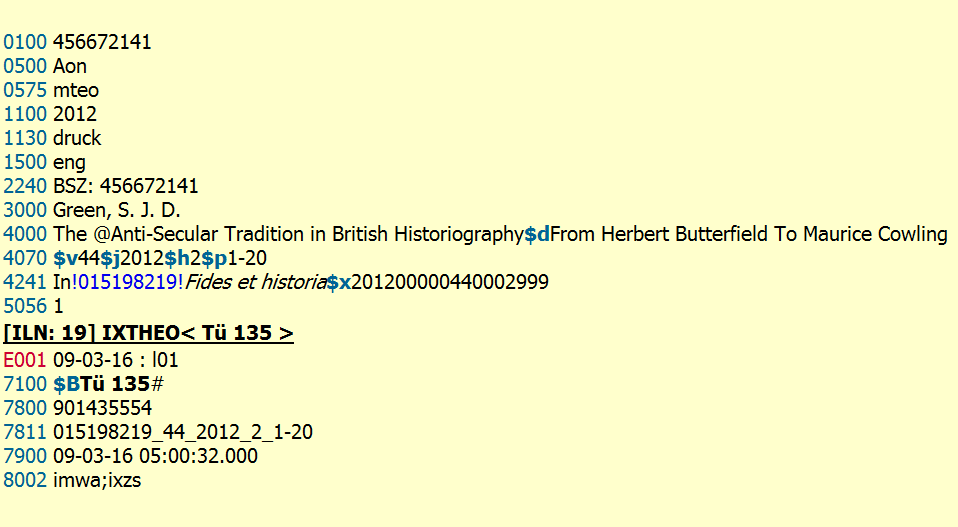
"Zotkat" in Kollaboration mit UB Mannheim


Data – sharing – (re)using – enriching – better data - sharing
Webdaten
Bibliotheksdaten
???

linked open data

PICA3-Translator
(einzeln)

PICA3-Translator (Batch)
Quick Copy
Quick Copy
WinIBW-Funktionsskript
Ein Arbeitsvorgang: Aufsatz-Metadaten
Sammeln > Konvertieren/Anreichern > Katalogisieren

1x Klick
in Datenmaske
function copyPaste() {
application.activeWindow.command("e", false);
application.activeWindow.title.insertText("0500 Oon\n0501 Text$btxt\n0502 Computermedien$bc\n0503 Online-Ressource$bcr\n1100 2010$n[2010]\n1130 cofz\n1500 eng\n1505 $erda\n2051 10.13109/jaju.2010.1.1.3\n3000 Berlin, Adele\n\n3010 Grossman, Maxine L.\n\n4000 Legal Fiction$dLevirate cum Land Redemption in Ruth$hAdele Berlin\n4070 $v1$j2010$h1$p3-18\n4085 $uhttp://www.vr-elibrary.de/doi/abs/10.13109/jaju.2010.1.1.3$xH\n4207 The article focuses on the use of the levirate and the land redemption in Ruth. It argues that Ruth, drawing on Torah texts, has fictionalized these laws. Ruth's portrayal of these laws does not depict actual practice in the postexilic era, nor was it intended as a midrash per se on Torah laws. The book of Ruth, a story of return from exile, joined together the levirate and land redemption because these laws address the continuity of family and of inherited property. The story of the Judean family who long ago underwent »exile« and almost lost its family line and its ancestral land, but whose continuity was restored by means of Torah laws, is a metaphor for the exilic or postexilic community, which is being encouraged to see in the Torah the vehicle for its own continuity of people and land. The article also examines possible inner biblical interpretations of the go'el law in Ruth and in Jeremiah 32.\n4241 Enthalten in!343621770!\n5056 1 \nE* l01\n6700 !372043526!\n7100$jn\n8002 ixzs;ixzo");
application.activeWindow.pressButton("Enter");
application.activeWindow.command("e", false);
application.activeWindow.title.insertText("0500 Oon\n0501 Text$btxt\n0502 Computermedien$bc\n0503 Online-Ressource$bcr\n1100 2010$n[2010]\n1130 cofz\n1500 eng\n1505 $erda\n2051 10.13109/jaju.2010.1.1.19\n3000 Goff, Matthew\n\n3010 Grossman, Maxine L.\n\n4000 Monstrous Appetites$dGiants, Cannibalism, and Insatiable Eating in Enochic Literature$hMatthew Goff\n4070 $v1$j2010$h1$p19-42\n4085 $uhttp://www.vr-elibrary.de/doi/abs/10.13109/jaju.2010.1.1.19$xH\n4207 In different ways the Book of Watchers, the Animal Apocalypse, Jubilees, and the Book of Giants present the insatiable appetite of the giants as the key for understanding their crimes, which include murder, anthropophagy and the consumption of blood. Blood plays a major role in the retribution by the angels against them. The appetite of the giants affects their recompense in that their bodies, not their spirits, are destroyed. In this form they can no longer eat; but, this essay suggests, their overwhelming hunger remains. The ancient Near Eastern background of depicting violence and death with language of eating is also explored. The theme of appetite is critical for understanding the giants and their crimes on earth.\n4241 Enthalten in!343621770!\n5056 1 \nE* l01\n6700 !372043526!\n7100$jn\n8002 ixzs;ixzo");
application.activeWindow.pressButton("Enter");
application.activeWindow.command("e", false);
application.activeWindow.title.insertText("0500 Oon\n0501 Text$btxt\n0502 Computermedien$bc\n0503 Online-Ressource$bcr\n1100 2010$n[2010]\n1130 cofz\n1500 eng\n1505 $erda\n2051 10.13109/jaju.2010.1.1.43\n3000 Eshel, Hanan\n\n3010 Eshel, Esther\n\n3010 !293872031!$BVerfasserIn$4aut \n8910 $aixzom$bAutor maschinell zugeordnet\n\n\n3010 Grossman, Maxine L.\n\n4000 »Hear, O Israel« in Gold$hHanan Eshel\n4070 $v1$j2010$h1$p43-64\n4085 $uhttp://www.vr-elibrary.de/doi/abs/10.13109/jaju.2010.1.1.43$xH\n4207 This article presents a recently discovered gold amulet, dated to the 3rd century C. E. and inscribed with the Hebrew text of the »Shema'« (Deut 6:4) in Greek characters. The amulet was found in 2000, in excavations of a cemetery in Halbturn, Austria. This discovery sheds new light on the history of the Jews in Roman Pannonia and illuminates how the Shema' was used and understood by Jews of late antiquity. In addition to a line-by-line commentary of the amulet, we also discuss the interpretive history of Deut 6:4 and the use of mezuzot and amulets in ancient Judaism.\n4241 Enthalten in!343621770!\n5056 1 \nE* l01\n6700 !372043526!\n7100$jn\n8002 ixzs;ixzo");
application.activeWindow.pressButton("Enter");
application.activeWindow.command("e", false);
application.activeWindow.title.insertText("0500 Oon\n0501 Text$btxt\n0502 Computermedien$bc\n0503 Online-Ressource$bcr\n1100 2010$n[2010]\n1130 cofz\n1500 eng\n1505 $erda\n2051 10.13109/jaju.2010.1.1.65\n3000 Noam, Vered\n\n3010 Grossman, Maxine L.\n\n4000 Ritual Impurity in Tannaitic Literature$dTwo Opposing Perspectives$hVered Noam\n4070 $v1$j2010$h1$p65-103\n4085 $uhttp://www.vr-elibrary.de/doi/abs/10.13109/jaju.2010.1.1.65$xH\n4207 This paper examines the rabbinic concept of impurity in terms of the essence of the reality that this term implies. Did the Rabbis consider impurity to be a force of nature, or rather an abstract formalistic structure devoid of any actual existence? A review of rabbinic sources regarding corpse impurity reveals that the essential structures of tannaitic halakhah are grounded in a natural, immanent perception of impurity, which gave rise to an entire system, intricate and coherent, of »natural laws of impurity.« Layered onto this system, as a secondary stratum of sorts comprising exceptions and »addenda«, is a more subtle halakhic tapestry woven from a diametrically opposed perception. This view subjects the concept of impurity to human awareness and intention, severing it from reality and, in so doing, also stripping it of its »natural« substance.\n4241 Enthalten in!343621770!\n5056 1 \nE* l01\n6700 !372043526!\n7100$jn\n8002 ixzs;ixzo");
application.activeWindow.pressButton("Enter");
application.activeWindow.command("e", false);
application.activeWindow.title.insertText("0500 Oon\n0501 Text$btxt\n0502 Computermedien$bc\n0503 Online-Ressource$bcr\n1100 2010$n[2010]\n1130 cofz\n1500 eng\n1505 $erda\n2051 10.13109/jaju.2010.1.2.143\n3000 Daim, Falko\n\n4000 The @Halbturn Excavation (1988 through 2009) - a Perspective$hFalko Daim\n4070 $v1$j2010$h2$p143-145\n4085 $uhttp://www.vr-elibrary.de/doi/abs/10.13109/jaju.2010.1.2.143$xH\n4241 Enthalten in!343621770!\n5056 1 \nE* l01\n6700 !372043526!\n7100$jn\n8002 ixzs;ixzo");
application.activeWindow.pressButton("Enter");
application.activeWindow.command("e", false);
application.activeWindow.title.insertText("0500 Oon\n0501 Text$btxt\n0502 Computermedien$bc\n0503 Online-Ressource$bcr\n1100 2010$n[2010]\n1130 cofz\n1500 eng\n1505 $erda\n2051 10.13109/jaju.2010.1.2.146\n3000 Doneus, Nives\n\n4000 The @Roman Child and the Jewish Amulet$hNives Doneus\n4070 $v1$j2010$h2$p146-158\n4085 $uhttp://www.vr-elibrary.de/doi/abs/10.13109/jaju.2010.1.2.146$xH\n4241 Enthalten in!343621770!\n5056 1 \nE* l01\n6700 !372043526!\n7100$jn\n8002 ixzs;ixzo");
application.activeWindow.pressButton("Enter");
}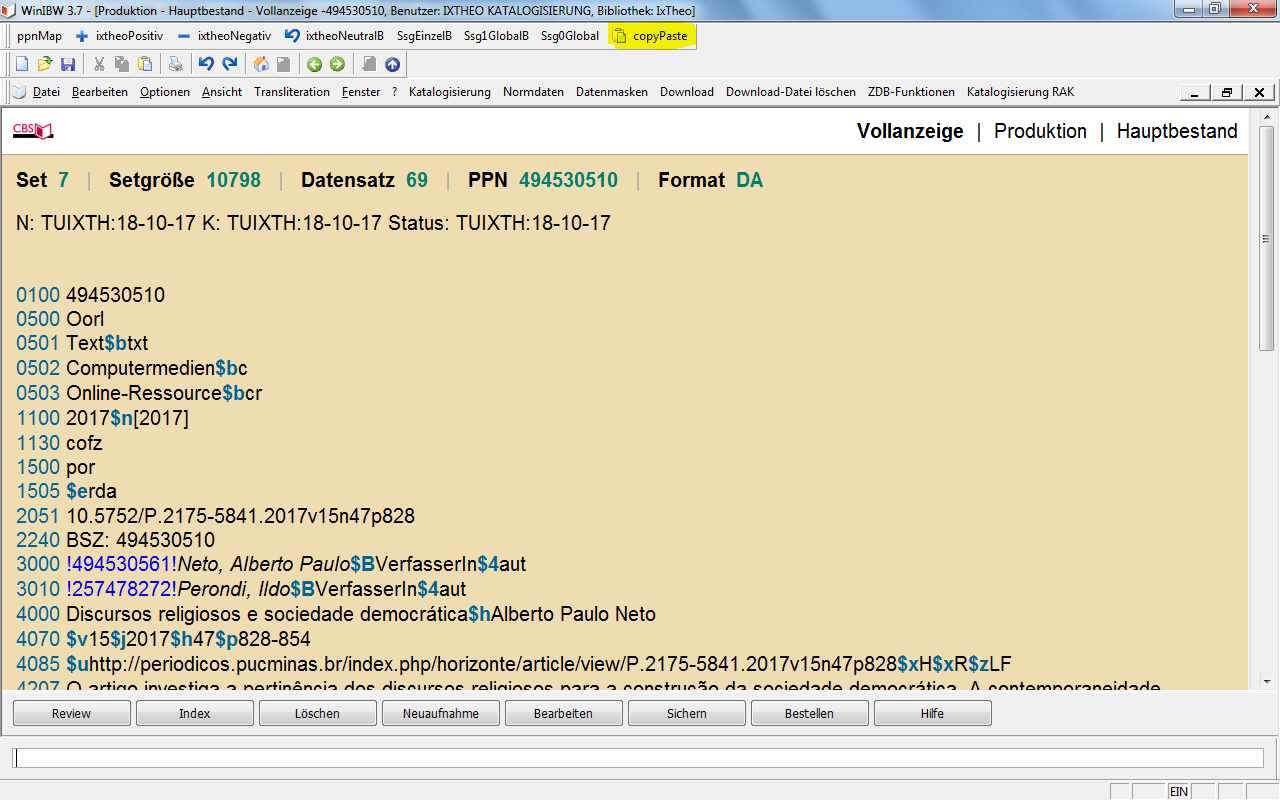
Geschäftsgang
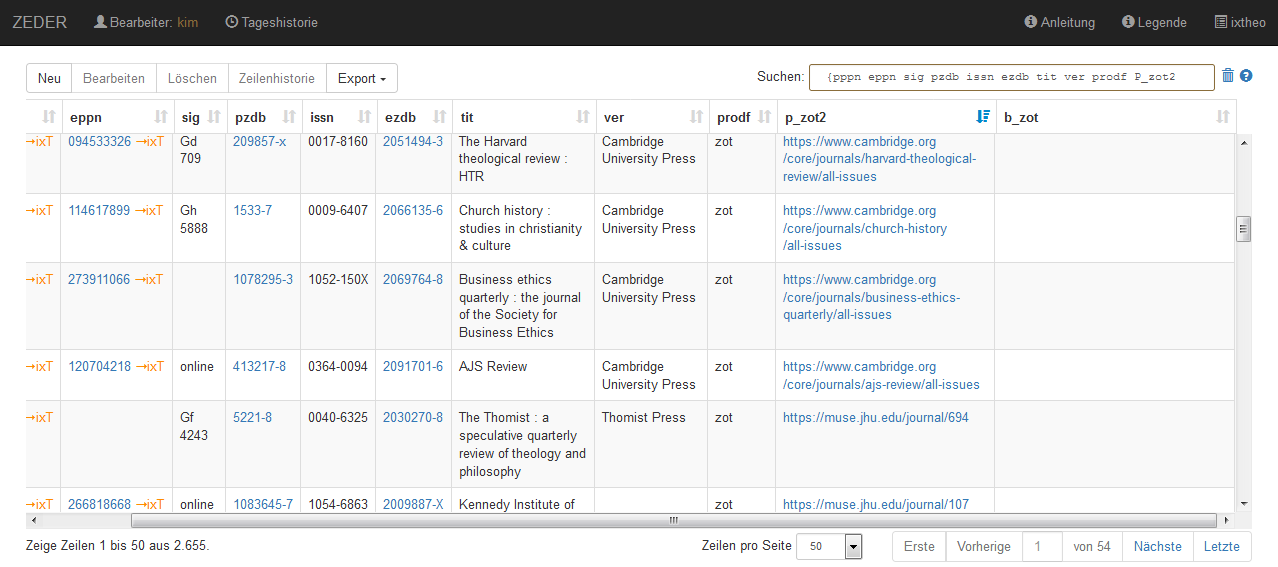
- Neuzugänge via RSS-Feeds überwachen und in eigene Sammlung herunterladen. Bei Zss. ohne Alerting-Möglichkeit im internen Zeitschriftenverwaltungstool "ZEDER" nach Downloadlink und -option suchen
- FEED-Einträge oder direkt aus Webseiten mit "Picker" in eigene Sammlungen hinzufügen
- Einträge aus Sammlungen einzel oder stapelweise in WinIBW mit "Copy&Paste" erfassen
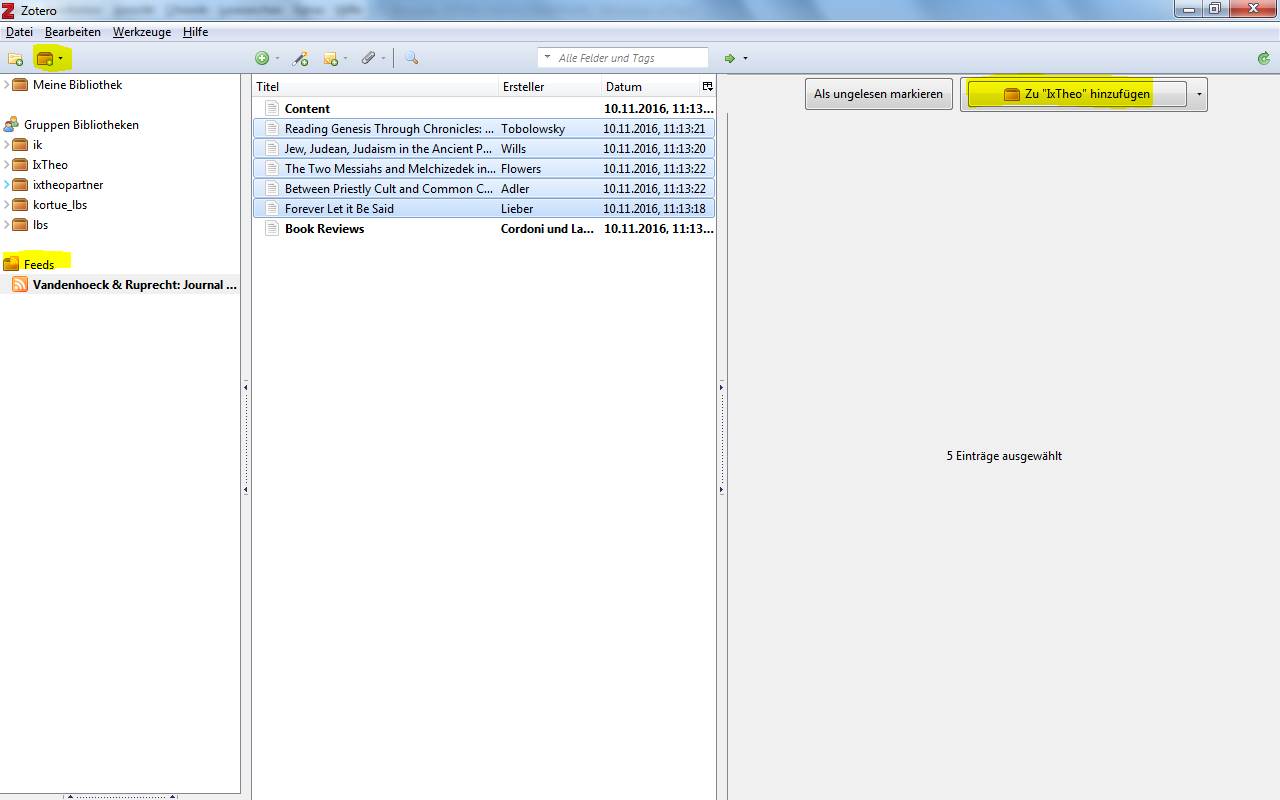
Datenanreicherung der Autorennamen mit SWB-PPN (=GND-ID)
IKT0=1 TRM0=
für Persönlicher Name in Picafeld 100
IKT1=2057 TRM1=3.*
für GND-Systematik
IKT2=8963 TRM2=theolog*
für Berufsbezeichnung 550
IKT3=8991 TRM3=1[1,2,3,4,5,6,7,8][0,1,2,3,4,5,6,7,8,9][0,1,2,3,4,5,6,7,8,9]
für Geburts- und Sterbedatum (Bereich)
var lookupUrl = "http://swb.bsz-bw.de/DB=2.104/SET=70/TTL=1/CMD?SGE=&ACT=SRCHM&MATCFILTER=Y&MATCSET=Y&NOSCAN=Y&PARSE_MNEMONICS=N&PARSE_OPWORDS=N&PARSE_OLDSETS=N&IMPLAND=Y&NOABS=Y&ACT0=SRCHA&SHRTST=50&IKT0=1&TRM0=" + authorName +"&ACT1=*&IKT1=2057&TRM1=*&ACT2=*&IKT2=8977&TRM2=theolog*&ACT3=-&IKT3=8978-&TRM3=1[1%2C2%2C3%2C4%2C5%2C6%2C7%2C8][0%2C1%2C2%2C3%2C4%2C5%2C6%2C7%2C8%2C9][0%2C1%2C2%2C3%2C4%2C5%2C6%2C7%2C8%2C9]?"
Bei Vollautomatisierung
ohne intellektuelle Nachkontrolle
der verknüpften Autoren-ID wird
folgender Vermerk im Feld 8910
auf Titelebene geschrieben:
8910 $aixzom$bAutor maschinell zugeordnet
0100 494530510
0500 Oorl
0501 Text$btxt
0502 Computermedien$bc
0503 Online-Ressource$bcr
1100 2017$n[2017]
1130 cofz
1500 por
1505 $erda
2051 10.5752/P.2175-5841.2017v15n47p828
2240 BSZ: 494530510
3000 !494530561!Neto, Alberto Paulo$BVerfasserIn$4aut
3010 !257478272!Perondi, Ildo$BVerfasserIn$4aut
4000 Discursos religiosos e sociedade democrática$hAlberto Paulo Neto
4070 $v15$j2017$h47$p828-854
4085 $uhttp://periodicos.pucminas.br/index.php/horizonte/article/view/P.2175-5841.2017v15n47p828$xH$xR$zLF
4207 O artigo investiga a pertinência dos discursos religiosos para a construção da sociedade democrática. A contemporaneidade filosófica tem observado que as religiões podem contribuir para a realização do objetivo de fraternidade e solidariedade entre os cidadãos com distintas orientações axiológicas. A teoria do discurso de Jürgen Habermas analisa que as sociedades contemporâneas estão vivenciando o processo de pós-secularização e o ressurgimento das religiões na esfera pública. O filósofo alemão considera que as instituições religiosas têm o conteúdo normativo e a legitimidade que está ausente nas instituições políticas e nos atores políticos. As religiões mundiais se caracterizam pelas ações sociais e o incentivo à solidariedade aos seus fiéis. No nível pós-metafísico de fundamentação da forma política, os discursos religiosos podem motivar os cidadãos para a atitude comunicativa e o entendimento sobre as normas sociais que deverão reger a sociedade justa e inclusiva. Nesse sentido, a experiência de auto-esclarecimento das religiões sobre as suas doutrinas e princípios de fé poderá colaborar para o entendimento entre os cidadãos religiosos e não-religiosos. Por fim, a análise da experiência católica de autorreflexão sobre suas doutrinas e o relacionamento com as diversas religiões se tornou o exemplo de diálogo para as entidades religiosas no mundo secular.
4241 Enthalten in!337893861!Horizonte$x201700000150047172
5056 0
5520 |s|Democracia
5520 |s|Democracy
5520 |s|Discourse theory
5520 |s|Discursos religiosos
5520 |s|Estado de direito
5520 |s|Habermas
5520 |s|Habermas.
5520 |s|Human rights.
5520 |s|Religious discourses
5520 |s|Rule of law
5520 |s|Teoria do discurso
8910 $aixzom$bAutor maschinell zugeordnetZotero
WinIBW
OGND
Kontextinformation (vordefinierte Suchaspekte):
- Berufsbezeichnung (theol*, Alttestament*, Pfarrer* etc.)
- Lebenszeitspanne (geboren ab 1900)
- etc.
Autorenname
(Textstring)
bei singulärem
Treffer
GND-ID
Wie anreichern?
-
Bibliografische Gattung/Status in 0500 (Position 1 und 4)
-
PPN Zeitschrift
-
Sprache
-
FID-Nummer
ISSN abhängige Mappingkonkordanz
var journalMapping = {
"0021-9231" : "!014411350!", // Journal of Biblical Literature
};
var issnLangMapping = {
"1010-9919" : "ger",
"0044-3549" : "ger",
};
var issnVolumeMapping = {
"2031-5929" : "N.S.",
};
var issnPhysicalFormMapping = { //Feld 0500 Position 1
"1550-0195" : "O",
};
var issnLicenceFieldMapping = {
"1550-0195" : "l",
};
var issnSsgMapping = {
"0044-3441" : "0; 1", // Zeitschrift für Religions- und Geistesgeschichte
};
var defaultSsgNummer = "1";
var defaultLanguage = "eng";
var cataloguingStatus = "r";//0500 Position 3
//URL --> 4085 nur bei Katalogisierung nach "Oox" im Feld 0500
if (item.url && physicalForm === "O" && licenceField === "l") {
writeLine("4085", "$u" + item.url + "$xH$xR$zLF");
} else if (item.url && physicalForm === "O") {
writeLine("4085", "$u" + item.url + "$xH");
}
if (item.url && item.itemType == "magazineArticle") {
writeLine("4085", "$u" + item.url + "$xH");
}
//Sortierzeichen hinzufügen, vgl. https://github.com/UB-Mannheim/zotkat/files/137992/ARTIKEL.pdf
if (item.language == "ger" || !item.language) {
titleStatement = titleStatement.replace(/^(Der|Die|Das|Des|Dem|Den|Ein|Eines|Einem|Eine|Einen|Einer) ([^@])/, "$1 @$2");
}
if (item.language == "eng" || !item.language) {
titleStatement = titleStatement.replace(/^(The|A|An) ([^@])/, "$1 @$2");
}
if (item.language == "fre" || !item.language) {
titleStatement = titleStatement.replace(/^(Le|La|Les|Des|Un|Une) ([^@])/, "$1 @$2");
titleStatement = titleStatement.replace(/^L'([^@])/, "L' @$1");
}
if (item.language == "ita" || !item.language) {
titleStatement = titleStatement.replace(/^(La|Le|Lo|Gli|I|Il|Un|Una|Uno) ([^@])/, "$1 @$2")
titleStatement = titleStatement.replace(/^L'([^@])/, "L' @$1");
}
Datenanreicherung
- Bibliographische Gattung und Status in 0500
- IMD-Felder in 0501-0503 und 1130 (Datenträgerfeld)
- Sprachfeld in 1500 (Default-Wert mögl.)
- DOI (in 2051 od. 2053 in Druckwerken)
- Verlinkung zu PPN-ID in 3000
- Sprachabhängige Sortierzeichen vor Artikel in 4000
- Elektronische Adresse und Zugriffsart in 4085 (hier Unterfeld)
- Abstracts 4207
- Verlinkung zur Zeitschrift in 4241
- Keywords 5020
- FID-Nummer in 5056
- Lokaldatensatz mit Abrufzeichen in 8002
N: TUIXTH:23-05-17 K: TUIXTH:23-05-17 Status: TUIXTH:23-05-17
0100 488914507
0500 Oorl
0501 Text$btxt
0502 Computermedien$bc
0503 Online-Ressource$bcr
1100 2016$n[2016]
1130 cofz
1500 eng
1505 $erda
2240 BSZ: 488914507
3000 !488914493!Husgafvel, Ville
4000 On the Buddhist roots of contemporary non-religious mindfulness practice$dMoving beyond sectarian and essentialist approaches$hVille Husgafvel
4070 $v52$j2016$h1$p87-126
4085 $uhttps://journal.fi/temenos/article/view/55371$xH$xR$zLF
4207 Mindfulness-based practice methods are entering the Western cultural mainstream as institutionalised approaches in healthcare, education, and other public spheres. The Buddhist roots of Mindfulness-Based Stress Reduction (MBSR) and comparable mindfulness-based programmes are widely acknowledged, together with the view of their religious and ideological neutrality. However, the cultural and historical roots of these contemporary approaches have received relatively little attention in the study of religion, and the discussion has been centred on Theravāda Buddhist viewpoints or essentialist presentations of ‘classical Buddhism’. In the light of historical and textual analysis it seems unfounded to hold Theravāda tradition as the original context or as some authoritative expression of Buddhist mindfulness, and there are no grounds for holding it as the exclusive Buddhist source of the MBSR programme either. Rather, one-sided Theravāda-based presentations give a limited and oversimplified picture of Buddhist doctrine and practice, and also distort comparisons with contemporary non-religious forms of mindfulness practice. To move beyond the sectarian and essentialist approaches closely related to the ‘world religions paradigm’ in the study of religion, the discussion would benefit from a lineage-based approach, where possible historical continuities and phenomenological similarities between Buddhist mindfulness and contemporary non-religious approaches are examined at the level of particular relevant Buddhist teachers and their lineages of doctrine and practice.
4241 Enthalten in!42401257X!Temenos$x201600000520001913
5056 0
5520 |s|Buddhism
5520 |s|meditation
5520 |s|mindfulness
5520 |s|Mindfulness-Based Stress Reduction
5520 |s|world religions paradigm
[ILN: 19] IXTHEO< Tü 135 >
E001 23-05-17 : l01
6999 23-05-17
7100 $BTü 135#$jn
7800 970122993
7900 23-05-17 12:16:49.000
7901 TUIXTH:23-05-17
8002 ixzs;ixzo
Vorteile
hohe Erschließungsqualität
Daten im Verbund nachnutzbar/-korrigierbar
langfristiger und kontrollierbarer
Metadatenpool



Ausblick und Weiterentwicklung 2018-2020
Zotkat4.0
- Datensammlung mit Crawler/Zotero Translation Server
- Hochladen der angereicherten Daten in WinIBW via automatisierten Batch-Speichervorgang oder Lieferung ans BSZ in Marc21/XML
- Maschinelle Kontrolle der Metadatenqualität auf Vollständigkeit





Zitationsdaten im Verbundsystem. Warum nicht?
Existiert noch keine PICA-Kategorie für Zitationsdaten,
Technisches Verfahren mit Zotkat/WinIBW-Skript für Datenanreicherung mit Zitationsdaten?
Weitere Ideen und Kooperationsmöglichkeit?
Literatur
- Faßnacht, Martin / Gebhard, Winfried, Index Theologicus – neue Produktionsverfahren bei der Bibliographieerstellung, in: b.i.t.online: 19 (2016) Nr. 6, http://www.b-i-t-online.de/heft/2016-06-nachrichtenbeitrag-fassnacht.pdf
- Kim, Timotheus Chang-Whae / Zumstein, Philipp, Semiautomatische Katalogisierung und Normdatenverknüpfung mit Zotero im Index Theologicus, in: LIBREAS. Library Ideas: 1 (2016) Nr. 29, http://dx.doi.org/10.18452/9093
-
Kim, Timotheus Chang-Whae, Neue Wege der Katalogisierung. Der neue Index Theologicus im FID Theologie. Vortrag auf dem DHB-Workshop München 2017, http://slides.com/timotheuskim/neue-wege-der-katalogisierung-ixtheo
-
Kim, Timotheus Chang-Whae / Zumstein, Philipp, Mit Open Source die Aufsatzkatalogisierung reformieren. Vortrag auf dem Bibliothekartag 2017, https://opus4.kobv.de/opus4-bib-info/frontdoor/index/index/docId/2993
-
"Zotkat" Github, https://github.com/UB-Mannheim/zotkat
-
IxTheo spezifische "Zotkat" Github, https://github.com/socheres/zotkat/tree/PicaSWB_ixzo
Halbautomatische Katalogisierung von Artikeln für einen Fachinformationsdienst
By Timotheus Kim
Halbautomatische Katalogisierung von Artikeln für einen Fachinformationsdienst
- 3,274



